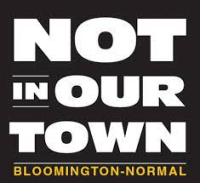Jesse Fell & Abraham Lincoln
Jesse Fell asks Abraham Lincoln to write autobiography
On Washington Street, outside Kersey Fell’s Law Office
106 W. Washington St., Bloomington
Location notes: Kersey Fell’s law office was located in an upper floor of this building. Lincoln visited his office frequently. The building still stands.
In his presidential ascendancy, Abraham Lincoln had a strong adherent in Jesse Fell (1808-1887). Fell was a lawyer, land speculator, philanthropist, abolitionist, Quaker, and business developer. He laid out the Town of Normal and strongly advocated for the Illinois State Normal School and the Illinois Soldiers’ Orphanage to locate in the small community. He helped formerly enslaved people come north and transition into local employment. He founded the Bloomington Pantagraph.
After Lincoln’s defeat in the 1858 US Senate race, Fell met Lincoln outside the second McLean County Courthouse and brought Lincoln to Kersey Fell’s office located in an upper floor of 106 W. Washington St. Jesse Fell, who had connections with eastern U.S. newspapers, asked Lincoln to write his autobiography, a statement to distribute nationally and enhance Lincoln’s standing. Lincoln was reluctant and it took him almost a year to comply with Fell’s request. Lincoln mailed his autobiography to Fell on December 20, 1859. The short autobiography is one of the few documents where Lincoln speaks about himself, including a physical description. In an age when people were known by their relatives and family name, Lincoln noted his early poverty. Lincoln wrote, “Of course when I came of age I did not know much. Still somehow, I could read, write, and cipher to the Rule of Three; but that was all. I have not been to school since. The little advance I now have upon this store of education, I have picked up from time to time under the pressure of necessity. I was raised to farm work, which I continued till I was twenty-two.”
In a most intriguing conclusion, Lincoln describes himself physically. “If any personal description of me is thought desirable, it may be said, I am, in height, six feet, four inches, nearly; lean in flesh, weighing on an average one hundred and eighty pounds; dark complexion, with coarse black hair, and grey eyes–no other marks or brands recollected.” Besides his thin frame, two statements stand out in this text. Lincoln’s opponents often rumored that Lincoln had African American heritage — his statement about his dark complexion and coarse hair shows his accurate self-portrayal and fearlessness about these rumors. Even more intriguing is his final phrase: “no other marks or brand recollected.” Is Lincoln slyly connecting himself to enslaved people, who were often “marked” or “branded?” His honest portrayal and self-effacement echoes in this statement.




Additional information can be found at the following links:
Jesse Fell – Making a Home – McLean County Museum of History online exhibit




